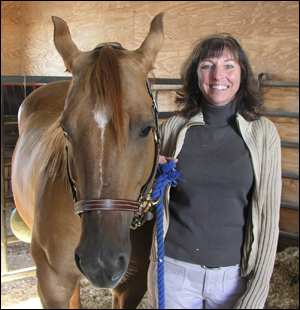Veterinary research looks to baboons, horses for clues to human disease
Friday, March 14, 2008

While age is the major risk factor, it is unknown what biological changes occur during aging that cause some individuals but not others to develop degenerative brain diseases such as Alzheimer’s and Parkinson’s disease. McFarlane’s study, “Initiating Factors of Neurodegeneration,” seeks to determine the underlying causes.
“We will use a comparative approach, looking at two animal models,” McFarlane said. “We chose not to induce disease but rather to study natural occurring disease processes to determine what events initiate the degeneration of dopamine-producing neurons in the central nervous system of humans.
“These are the neurons that degenerate when someone is suffering from Parkinson’s disease,” she said.
In collaboration with Dr. Gary White, an OSU veterinary medicine alumnus now at the University of Oklahoma Health Sciences Center, McFarlane will investigate the aging process of baboons. Events that occur as part of natural aging in baboons will be characterized, and events and markers that predict severity of neurodegeneration will be identified.
The team also will study neurodegeneration in horses with Cushing’s disease. Similar to Parkinson’s disease in that it is caused by the degeneration of dopamine-producing neurons, the common endocrine disease afflicts approximately 15 percent of old horses and ponies.
“In its late stage it is easily recognizable as the animals grow long, curly, hairy coats,” McFarlane said.
The team believes understanding the age-related events that contribute to development of equine Cushing’s disease and baboon age-associated dopaminergic neurodegeneration can provide useful comparisons in unraveling the cause of Parkinson’s disease.
McFarlane’s study was funded by a $600,000 grant from NIH’s National Center for Research Resources (NCRR), through the Division of Comparative Medicine. NCRR helps meet the needs of laboratory scientists and clinical researchers by providing environments and tools to understand, detect, treat and prevent a wide range of diseases.
A main objective of NCRR is to train more veterinarians to conduct comparative medical research.
